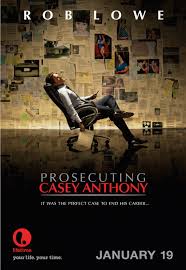
PROSECUTING CASEY ANTHONY
US, 2013, 95 minutes, Colour.
Rob Lowe, Elizabeth Mitchell, Kevin Dunn, Oscar Munoz, Marisa Ramirez, Virginia Welch.
Directed by Peter Werner.
Prosecuting Casey Anthony is based on an actual case in Florida, the death of a child in 2007 and the prosecution of the mother several years later. She was found not guilty, despite public opinion against her and protests outside the court.
This is a star vehicle Rob Lowe who served as producer of the film. He plays Jeff Ashton, working in the DA’s office in Miami, taking on one last case and expecting to win. There is a great deal of the running time of the film investigating and speculating on the killing, the mother’s 31 days before reporting the child missing, the burial of the child and the involvement of Casey’s policeman father, the role of her husband. While the prosecuting team thought the evidence was strong, it was still circumstantial. One of the surprises was Casey’s accusations against her father of sexual abuse when she was at home. This was something he vigorously denied.
As expected, a great deal of the running time is in the courtroom sequences where Ashton may have relied too much on his speculations and not anticipated the spirited defence, shrewd, accusatory.
Oscar Nunez is very good as the defence attorney, Elizabeth Mitchell as Linda, associate of Jeff Ashton. Kevin Dunn is Casey’s father.
While American audiences may be very familiar with the case, it is completely new to most audiences who watch it.
1. An interesting telemovie? The murder case? Criminal investigations? The police? In court, the judge, prosecutor and defence?
2. An actual American case, well known in the United States? American reaction? Against Casey Anthony? The impact for world audiences who know nothing of the case?
3. Miami, the city, offices, courts, restaurants and homes? Realism? The musical score?
4. The title, the focus? Jeff Ashton and his book? The television interview after the event? The not guilty verdict and the audience knowing the outcome? Going back to the interview and the questions throughout the film? Ashton’s opportunity to talk, reflect, his puzzle, issues of justice and the law?
5. Ashton, his life, career, coming to an end of prosecutions, take the case, his motivation? His relationship with his wife, her continued support?
6. Linda and the members of his staff? The characters, expertise, research, planning, Linda and her opening speech? The prosecution in court? The bets about calling Casey Anthony as witness? The ups and downs of the case? Cross-examination? Amazement at the outcome of the case?
7. Casey Anthony, information about her, her story, as a person, relationship with her parents, husband, child? The witnesses in favour of her? As a caring mother? The death of her child, not reporting at the 31 days, the video sequences of her flirting and the store, her arrest?
8. Her father, interrogation by the police, interrogation by Ashton? His presence in the court, finding the baby? The defence counsel and the accusations of sexual abuse? Casey and the information? The effect? Her mother in court, said, her testimony, the threat of perjury?
9. The range of friends, their testimony?
10. The forensic, the body of the child, the skeleton, the tape over the face, the reconstruction and photo? The experts and their discussions about tape, speculations?
11. The range of circumstantial evidence and its effect on the jury?
12. The jury? The speeches by prosecutor and defence? The not guilty verdict?
13. The defence counsel, his personality, nationally others underestimating him, the power of his cross-examinations, the evidence? His statements and
objections sustained? Casey and her demeanour? Her weeping? His being the underdog?
14. The public, the protests against Casey Anthony, Ashton as a hero?
15. The information about changing the legislation and Casey Anthony being liable for lying to the police?
16. The interest in the case, the prosecution and defence? The popularity of court films?